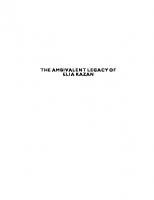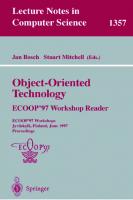Recursion Theory and Complexity: Proceedings of the Kazan '97 Workshop, Kazan, Russia, July 14–19, 1997 9783110807486, 9783110165876
184 24 7MB
English Pages 247 [248] Year 1999
I. Priority method in generalized computability
D. Polynomial-time versus computable Boolean algebras
R. The proof-theoretic strength of the Dushnik-Miller Theorem for countable linear orders
V. Effectively nowhere simple relations on computable structures
P. Jump traces with large gaps
Weak recursive degrees and a problem of Spector
Compositions of permutations and algorithmic reducibilities
Some properties of majorant-computability
Hyperarithmetical functions and algebraicity
Weak presentations of fields not extendible to recursive presentations
Jumps of ∑2 0-high e-degrees and properly ∑2 0 e-degrees
Enumeration reducibility and the problem of the nontotal property of e-degrees
Algebras of recursive functions
∑2 Induction and cuppable degrees
Open problems
List of talks
List of contributors
Recommend Papers

- Author / Uploaded
- Marat M. Arslanov (editor)
- Steffen Lempp (editor)
File loading please wait...
Citation preview
de Gruyter Series in Logic and Its Applications 2 Editors: W. A. Hodges (London) · R. Jensen (Berlin) S. Lempp (Madison) · M. Magidor (Jerusalem)
1749
1999
Recursion Theory and Complexity Proceedings of the Kazan '97 Workshop Kazan, Russia, July 14-19, 1997 Editors
Marat M. Ar siano ν Steffen Lempp
W Walter de Gruyter G Berlin · New York 1999 DE
Editors
Marat M. Arslanov Department of Mathematics Kazan State University 420008 Kazan Russia
Steffen Lempp Department of Mathematics University of Wisconsin 480 Lincoln Drive Madison, WI 53706-1388 USA
Series Editors Wilfrid A. Hodges School of Mathematical Sciences Queen Mary and Westfield College University of London Mile End Road London El 4NS, United Kingdom
Ronald Jensen Institut für Mathematik Humboldt-Universität Unter den Linden 6 10099 Berlin, Germany
Steffen Lempp Department of Mathematics University of Wisconsin 480 Lincoln Drive Madison, WI 53706-1388, USA
Menachem Magidor Institute of Mathematics The Hebrew University Givat Ram 91904 Jerusalem, Israel
1991 Mathematics Subject Classification: 03-06; 03Dxx Keywords: Computability, recursion, complexity ®
Printed on acid-free paper which falls within the guidelines of the ANSI to ensure permanence and durability
Library of Congress - Cataloging-in-Publication Data Kazan '97 Workshop (1997 : Kazan , Russia) Recursion theory and complexity : proceedings of the Kazan '97 Workshop, Kazan, Russia, July 14-19, 1997 / editors Marat M. Arslanov, Steffen Lempp. p. cm. - (De Gruyter series in logic and its applications, ISSN 1438-1893; v. 2) "This volume contains the proceedings of the International Workshop 'Recursion Theory and Complexity Theory' (WORCT '97), which was held from July 14 to July 19, 1997 at Kazan State University, Kazan, Tatarstan, Russia." ISBN 3-11-016587-2 (alk. paper) 1. Recursion theory Congresses. 2. Computational complexity Congresses. I. Arslanov, M. M. (Marat Mirzaevich) II. Lempp, StefTen, 1959- . III. Title. IV. Series: De Gruyter series in logic and its applications ; [2]. QA9.6.K39 1997 511.3'5-dc21 99-32783 CIP Die Deutsche Bibliothek - Cataloging-in-Publication Data Recursion theory and complexity : proceedings of the Kazan '97 workshop, Kazan, Russia, July 14-19, 1997 / ed. Marat M. Arslanov ; Steffen Lempp. - Berlin ; New York : de Gruyter, 1999 (De Gruyter series in logic and its applications ; 2) ISBN 3-11-016587-2
ISSN 1438-1893 © Copyright 1999 by Walter de Gruyter GmbH & Co. KG, D-10785 Berlin. All rights reserved, including those of translation into foreign languages. No part of this book may be reproduced in any form or by any means, electronic or mechanical, including photocopy, recording, or any information storage and retrieval system, without permission in writing from the publisher. Printed in Germany. Typesetting using the Authors' TgX files: I. Zimmermann, Freiburg - Printing and binding: WB-Druck GmbH & Co., Rieden/Allgäu - Cover design: Rainer Engel, Berlin.
Preface
This volume contains the proceedings of the International Workshop "Recursion Theory and Complexity Theory" (WORCT'97), which was held from July 14 to July 19, 1997 at Kazan State University, Kazan, Tatarstan, Russia. The meeting was attended by more than 40 participants in the Recursion Theory part and about 20 participants in the Complexity Theory part from 9 different countries. The Workshop was organized by Kazan State University, the V. A. Steklov Institute of Mathematics (Moscow) and the N. G. Chebotarev Research Institute of Mathematics and Mechanics (NIIMM, Kazan). Financial support was provided by the Russia Foundation for Basic Research (RFBR) and the Tatar Academy of Sciences. The participants from the United States were supported by the National Science Foundation. The preparation of the two main branches of the Workshop was coordinated by M. M. Arslanov and S. Lempp (Recursion Theory), and F. M. Ablayev and A. A. Razborov (Complexity Theory). This volume reflects a part of the Recursion Theory branch of the actual program of the Workshop. The volume contains also the list of open problems in recursion theory mentioned at the open problem sessions. M. Arslanov S. Lempp
Table of contents
/. V. Ashaev Priority method in generalized computability D. Cenzer and J. B. Remmel Polynomial-time versus computable Boolean algebras R. G. Downey and S. Lempp The proof-theoretic strength of the Dushnik-Miller Theorem for countable linear orders V. S. Harizanov Effectively nowhere simple relations on computable structures P. G. Hinman Jump traces with large gaps Sh. Ishmukhametov Weak recursive degrees and a problem of Spector Κ. V. Korovin Compositions of permutations and algorithmic reducibilities M. V. Korovina and Ο. V. Kudinov Some properties of majorant-computability A. S. Morozov Hyperarithmetical functions and algebraicity A. Shlapentokh Weak presentations of fields not extendible to recursive presentations
R. Shore and A. Sorbi Jumps of Ej-high e-degrees and properly Σ ® e-degrees
vili
Table of contents
Β. Solon Enumeration reducibility and the problem of the nontotal property of e-degrees
173
V. Solovyev Algebras of recursive functions
193
Yue Yang Σ2 Induction and cuppable degrees
215
Open problems
229
List of talks
235
List of contributors
237
Priority method in generalized computability Igor V. Ashaev
1. Introduction This paper contains some research results on recursively enumerable Turing degrees in generalized computability (computability over arbitrary algebraic structures). The main result is a proof of two analogues of the Sacks Splitting Theorem for some classes of algebraic structures, including fields of the real, complex and p-adic numbers. The proof proceeds by the finite injury priority method based on using formulas of a language L MiM . It shows that such methods can be used in generalized computability in spite of dealing with nonconstructive structures. Our result applied to the structure (Ν, +, χ , 0,1) gives the Sacks Splitting Theorem for arithmetic, so it can be viewed as another variant of the proof of the classical Splitting Theorem. We use a formalization of generalized computability from [ABM], Briefly, it consists of three steps. Let Λ = (Α,σ) be a structure in a finite signature σ. In the first step, we introduce a machine over a structure









